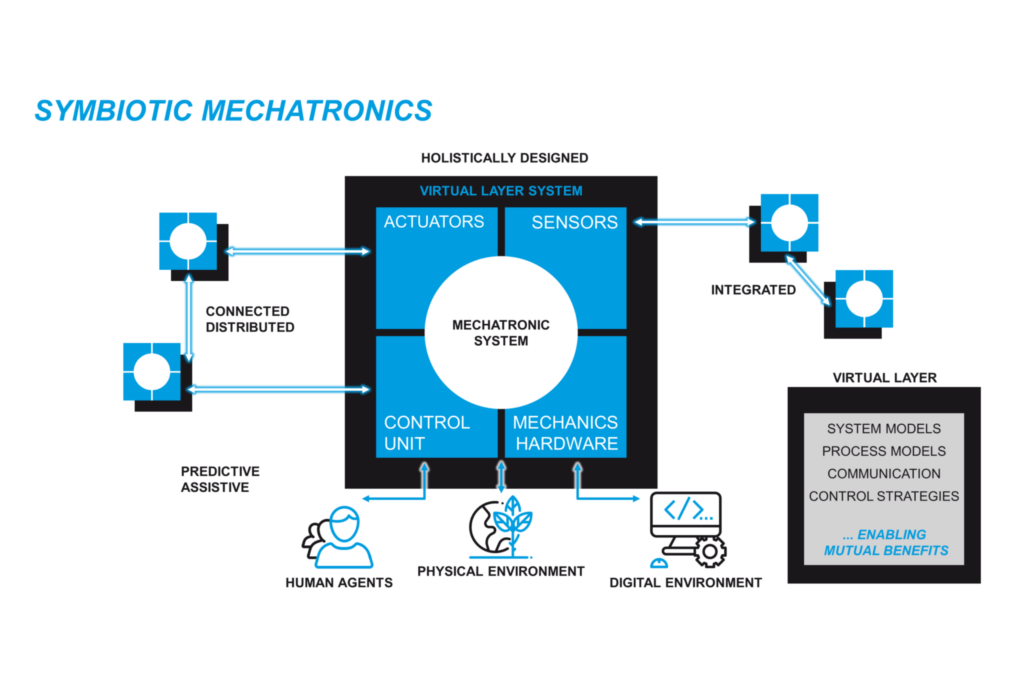ACT
Dipl.-Ing. Dr. Gerald Jungmayr
MECON
Dip.-Ing. Dr. Thomas Gross
SENS
Dipl.-Ing. Dr. Markus Pichler-Scheder
SYMB
Dipl.-Ing. Dr. Johannes Klinglmayr, MA
LCM operates a COMET K2 competence center called “Symbiotic Mechatronics” to keep its finger on the technological pulse. COMET competence centers are financed by the Republic of Austria – specifically the BMIMI and BMWET, the participating federal states and the participating companies and research organizations. This funding enables LCM to carry out risky innovative projects with various partners at the interface between science and industry. These projects are managed by the Austrian Research Promotion Agency (FFG).
Symbiotic mechatronics is a novel paradigm for mechatronic systems that promotes mutual benefit from the interaction between “symbiotic partners” such as mechatronic systems, their elements and their respective physical, digital and human environments.
With the novel concept of symbiotic mechatronics, we have extended mechatronics to new challenges in and around classic mechatronics. Driven by information and communication technology (ICT) and digitalization, a virtual layer integrates the useful interaction between mechatronic systems and their respective environments.
Mechatronic systems are indispensable components in today’s world. In the future, however, it will become increasingly important for these systems to interact with each other and with their physical, digital, human or climate-specific environments. We are developing this path and supporting partners and customers in this transformation from classic mechatronics to symbiotic mechatronics.

actuator technology, as one of the core functions of every mechatronic system, as well as the holistic design of complex systems.
Complex mechatronic systems and their digital representations for the purpose of control and optimization.
Sensor technology as a sensory organ of systems and fused data processing with a link to machine learning.
Transdisciplinary context of mechatronics with its interfaces to humans, the environment and the digital world.
LCM’s intensive cooperation with international universities and research partners is the basis of a sustainable internationalization strategy. The scientific results of the Comet K2 research projects, together with the expertise of our employees, form the basis for the successful development of new smart, networked or autonomous systems.
ACT
Dipl.-Ing. Dr. Gerald Jungmayr
MECON
Dip.-Ing. Dr. Thomas Gross
SENS
Dipl.-Ing. Dr. Markus Pichler-Scheder
SYMB
Dipl.-Ing. Dr. Johannes Klinglmayr, MA
ACT
Univ.-Prof. DI Dr. Gerd Bramerdorfer (JKU)
Univ.-Prof. DI Dr. Gudrun Mikota (JKU)
MECON
Univ.-Prof. DI Dr. Markus Schöberl (JKU)
O.Univ.-Prof. Dipl.-Ing. Dr. Michael Krommer (JKU)
SENS
Univ.-Prof. Dipl.-Ing. Dr. Andreas Springer (JKU)
Univ.-Prof. Dipl.-Ing. Dr. Bernhard Jakoby (JKU)
SYMB
Univ.-Prof. Dipl.-Ing. Dr. Bernhard Jakoby (JKU)
Associate Professor Dr. Susanne Saminger-Platz (JKU)
Minna Lanz (Finland)
Jiri Sloupensky (Czech Republic)
Aude Billard (Switzerland)
Harri Kulmala (Finland)
Iris Grässler (Germany)
Peter Steinrück (Austria)
Dissertation
Patents
Scientific international publications
Master’s and diploma theses
Since 01. 01. 2018
The COMET Centers (K2) are a central funding instrument of the FFG to strengthen application-oriented cutting-edge research in Austria. They promote long-term cooperation between science and industry and thus enable innovations with a high economic and social impact. The FFG supports these strategic partnerships and thus sustainably strengthens Austria as a research and technology location.

